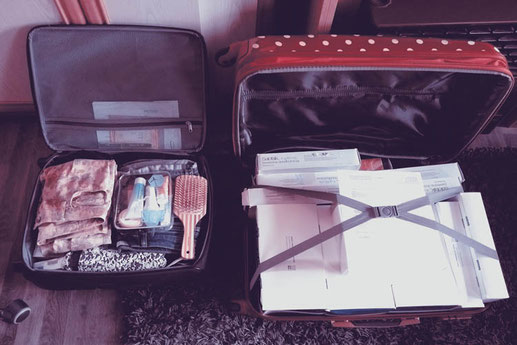Between a Full Crisis and a Laughing Fit: Chronic Illness and Long-term Travel.
June 6, 2020

The guy at airport security looks at the boxes and bottles in my hand luggage like something fishy was going on here. “What is that?” he asks. I want to shout, “COCAINE!” loudly.
But then I realize that if I said that, I would probably spend the rest of the day in solitary confinement rather than on the airplane. So I decide to tell him the truth. “These are my medications. I have a chronic illness. I have my certificate with me.”
He nods. Then he waves me through, but he still looks at my pack with a magnifying glass. I run all my carry-on through the scanner. Then I begin to laboriously repack my laptop, camera, and other sundry electrical paraphernalia which I had to unpack item by item during the initial screen. The security dude reappears. “Could you tell me what kind of illness you have?”
I want to shout, “LEPROSY!” For a moment. I have no idea why I sometimes have these Tourette-like impulses. Instead, I calmly answer, “Ulcerative Colitis. It is a chronic bowel inflammation. That’s when…”
“Okay, that’s all I need to know.” The guy suddenly calls after me and waves, “Get well soon!”
I almost laugh. On one hand, his reaction to Ulcerative Colitis was quite similar to the one I would expect from having said leprosy. And on the other hand, because “chronic” means, among other things, that it is incurable. There is no getting well soon. But I don’t let the diagnosis spoil my mood from the beginning. Not even with my prolonged travels. Long-term travel with my chronic illness goes somewhere between a full crisis and a laughing fit.
To the pharmacy with the Ikea bag

When I go to the pharmacy every few months, I must take my large Ikea bag with me because of the amount of crap that I need. Granules, tablets, liquids. It was very clear when I was diagnosed with Ulcerative Colitis: this is not simply a runny nose. Ulcerative Colitis is the little sister of Chron's Disease. An autoimmune disease where the gut keeps thinking it has to fight something that isn’t there, kind of like a conspiracy theorist. In any case, it causes a permanent inflammation and if untreated will cause cramping and diarrhea so bad that even hoarding toilet paper would not be enough. Fortunately, there are medications. I keep saying this to myself when I’m about to go crazy because of the whole mixed medication madness. Because there are other diseases you can’t do anything about. So I wind up with the Old Maid in my hand, but at least I haven’t sunk the Eight Ball.
If I were a normal person living a normal life, every few months I would simply pick up my prescriptions, get them filled and take them daily. But I am not normal. I am addicted to travel. For about six months every year. So how do I get enough medication, and how do I pay for it? Because this stuff is slightly more expensive than aspirin.
When nobody feels responsible

My doctor is not a general practitioner. He is a gastroenterologist. Gastro-enter-what? No matter. He is a specialist in diseases of the intestines. And he is a travel nut as well. Thank goodness. Because I don’t have to explain to him why I want to spend five months in the USA every summer. His first thought is just to have the medication sent from Germany. But sending drugs from the EU to the US is about as easy as taking a stroll across the North Korean border. It takes 700 forms and it may hang in customs for a few solid weeks with some luck, and it may not even arrive at all. This is not funny because if I don’t take the medication regularly, the symptoms may return uncontrollably, and I wind up in the hospital.
International health insurance simply waves it off. “Ulcerative Colitis? Nope. Preexisting disease. We won’t pay for medication while you are abroad.”
It’s like trying to insure a house against flooding that sits on the bank of the Mississippi. How about if I buy the medication myself in the USA? Oh, no problem. It’s only about $1000 per month. Whoa!
I’m about to violently throw something against the wall. Isn’t it enough that I have this plague around my neck, that I could have a relapse at any time and that I am always dealing with side effects? Is this heartache something that I chose? I don’t think so.
Ulcerative Colitis and the drug mafia

So what do I do? I wind up getting as many medications as possible in advance and then stuff them into a
monstrous suitcase. With a certificate written in English. I also hope that I am not mistaken for being part of some drug cartel. In most countries, the amount of medication you
can bring is limited. “What is appropriate to the duration of the trip,” is what they say. Well, I am on the road for five months. What can I do about it!?
The evening before I leave, I pack a small carry-on suitcase which holds all my clothes and personal items. Next to this tiny
carry-on, is a behemoth of suitcase that is filled to the brim with boxes full of prescription medication. The certificate decorates the top of the heap. Like gift-wrapping
paper. I have to sit on top of the case to close the mouth of the beast. My dad comes to take me to the airport.
“What’s that?” he asks in his typical charmingly frank manner. I roll my eyes.
A few hours later I am at the airport in Amsterdam. Check-in goes smoothly and no one asks what is in the stupid suitcase. I take out two silver packages of white ganules that I have to swallow every morning, along with my other meds. The person in the next seat stares. I realize for the first time, she perhaps thinks I’m taking cocaine. This should become a running gag.
Stress at the Airport

Of course, the border patrol fishes me out of crowd when I arrive in Minneapolis. A little later there are three Homeland Security officers standing around my opened suitcase. Guys standing at least 6’10” tall with shoulders like concrete blocks. One wave of sweat flows over me after another. I keep thinking how my Ulcerative Colitis is triggered by stressful incidents.
By the end it turns out that it was not my 300 tons of medication that was the problem, but rather a confusing entry in an old travel diary, which they interpreted very imaginatively. But that is another story for another time. All they said about the medication is, “That’s all okay. Everything is on the certificate.” Now I can breathe normally again.
The entire summer after that is totally relaxing. I still take cortisone, a drug that almost miraculously takes away any inflammation. Unfortunately, it does have many nasty side effects, like crumbly bones, severe acne, paper-thin skin, high blood pressure, stomach ulcers, insomnia and bloating like a sponge. It also suppresses the immune system so that the body cannot plot to attack itself, but that also makes me more susceptible to all other diseases. Still, there is no other drug that can help suppress an acute flare-up of Ulcerative Colitis so dramatically.
Traveling with Ulcerative Colitis - it works!

Another disadvantage of cortisone is that you cannot simply stop taking it or the disease will
suddenly flare up again. You have to “sneak it out of the body.” You must take a slightly smaller dose each week, so the body doesn’t notice what’s happening. Kind of like a
pacing cat that tries to sneak closer and closer to the bag of dry cat food. Another thing: cortisone has to be taken in the morning between 6 and 8 AM. Not cool when you just flew 30 hours and now must get out of bed at 7 AM after just four hours of sleep.
Here’s a useful tip for other weary travelers who cross multiple time zones: I used to take 15 milligrams of cortisone every morning. So, for a while I will take 7.5 mg at the
“German 7 AM” and another 7.5 mg for the “American 7 AM.”
It has been over a year since I was diagnosed with Ulcerative Colitis. Since that time, I have been traveling for about eight months, and despite the Coronavirus, the next trip is in the starting blocks. Unfortunately, my medication does take some of the spontaneity out of travel. I always must think of my medication early in my planning so I will have enough, then count out enough to last for the entire trip, and make sure I have a certificate if I want to go abroad. I also have to listen to the warning signals that my body sends me and try to reduce my stress levels.
The most important thing is this: The disease and I are not enemies. It is just like an annoying teenager who keeps pounding you in the gut but will always be part of the family. When I travel, it travels with me. Long term travel with a chronic disease: it sometimes works.


